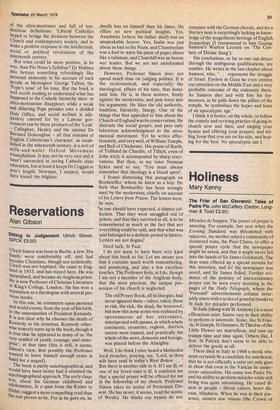Reservations
Alan Gibson
Sitting in Judgement Ulrich Simon, (SPCK £3.50) Ulrich Simon was born in Berlin, a Jew. His family were comfortably off, and had become Christians, though not technically. Ulrich was not baptized. He came to England in 1933, and has stayed here. He was naturalised, and became an Anglican priest. He is now Professor of Christian Literature at King's College, London. He has won a reputation as a theologian with several previous books.
In this one, he comments upon personal and world events, from the year of his birth, to the assassination of President Kennedy. It is not clear why he chooses the death of Kennedy as his terminus. Kennedy otherwise scarcely turns up in the book, though it IS true that he appeared to many of us 'the very symbol of youth, courage, and enterprise', at that time (this is still, it seems, Simon's view. But possibly the Professor wanted to leave himself enough years in hand for a sequel). The book is partly autobiographical, and would have been better had it retained the autobiographical approach. The early chapters, about his German childhood and adolescence, in a span from the Kaiser to Hitler, suggest a more compelling read than the rest proves to be. For as he goes on, he
dwells less on himself than his times. He offers no new political insights. Yes, Auschwitz (where his father died) was an unspeakable horror. Yes, Stalin was just about as bad as the Nazis, and Chamberlain was a fool to wave his piece of paper about like a talisman, and Churchill was an heroic war leader. But we are not uninformed about these things.
However, Professor Simon does not spend much time on judging politics. It is the ecclesiastical, and especially the theological, affairs of his time, that dominate him. He is, in these matters, firmly against the modernists, and puts force into his arguments. He likes the old authority, tradition, hierarchy, liturgy. One of the things that first appealed to him about the Church of England was its conservatism. He distrusts the social gospel, and pays only lukewarm acknowledgment to the oecumenical movement. Yet he writes affectionately, and very well, of William Temple, and Bell of Chichester. His praise of Barth, of Teilhard de Chardin, of Tillich, even of John xxitt, is accompanied by sharp reservations. But then, as my tutor Norman Sykes used to say, `You must always remember that theology is a blood sport'.
I found distressing this paragraph on Bonhoeffer, whom he knew as a boy. He feels that Bonhoeffer has been wrongly used by the modernists, chiefly on account of his Letters from Prison. The letters were, he says, cas one should have expected, a chance collection. That they were smuggled out of prison, and that they survived at all, is to be remembered as much as the fact that not everything could be said, and that what was said belonged to a definite period in history. Letters are not dogma!
Hard luck, St Paul.
I do not seem to have been very kind about this book so far. Let me assure you that it contains much worth remembering, and pondering, and also a few excellent touches. The Professor feels, as I do, though I am not a member of the Anglican body, that the most precious, the unique possession of his church is neglected.
The old Prayer Book, all its liturgies, had never ignored these — rulers, ruled, those at risk, the sick, the dead, the bereaved; but now this terse series was replaced by spontaneous ad hoc utterances, interspersed with pauses, in which whole continents, countries, regions, districts, streets were named, and practically the whole of the news, domestic and foreign, was placed before the Almighty.
Well, I do think I once heard a Methodist local preacher, praying, say, `Lord, as thou wilt have read in today's West Briton . But there is another side to it. If I am ill, or one of my loved ones is ill, it comforts me that a special prayer will be offered for me in the fellowship of my church. Professor Simon takes no notice of Protestant Dissent. He has never, it seems, read the works of Wesley. He thinks our hymns do not
compare with the German chorals, and for a literary man is surprisingly lacking in knowledge of the magnificent heritage of English hymnology (I recommend to him Georee Samson's Warton Lecture on `The Century of Divine Song').
His conclusions, so far as one can detect through the ambiguous qualifications, are sombre. He writes in the last chapter about Samson, who, ' . . . represents the struggle of Israel. Eyeless in Gaza he even centres our attention On the Middle East and a very probable outcome of the stalemate there. As Samson dies and with him his tormentors, as he pulls down the pillars of the temple, he symbolises the hopes and fears of an apocalyptic age.'
I think it is better, on the whole, to follow the comely and reviving practice of going to church now and then, and singing your hymns and offering your prayers, and telling Jesus that you are on his side, and hoping for the best. No apocalyptic am I.


































 Previous page
Previous page